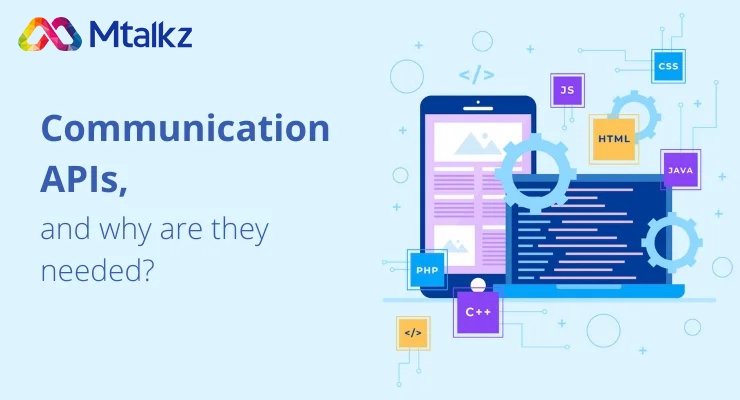Recently we have been hearing the term API too frequently, mostly when we talk about a company, its communication, and digitization. API is an abbreviation used for Application Programming Interface, defined as a set of definitions or protocols used for building and integrating software for digital service. Now that you know what APIs are, it is important to understand what communication APIs mean and why they are important.
Communication APIs are APIs that give businesses the ability to embed text messaging, voice services, email functionality, WhatsApp chatting and other communications functionality into a software application. With the growth of the digital world, all the companies are now shifting to the digital platform and hence embracing APIs at an increased pace. The APIs help make the business process much easier, more reliable, and highly efficient. They are the need of the hour as without them almost all enterprise systems will become time-consuming, manual, and as a result of this much expensive.
One of the key business processes of all enterprises and corporates is communication. To stay highly engaged with their customers, vendors, employees and stakeholders, communication APIs are called to build trust and connections. Furthermore, given the smart level of communication technology available in the enterprise space today, it is in the company’s interest to be well placed in the market by utilising cutting-edge multi-channel business communication tools. This will help the companies enhance their growth capabilities by boosting operations, having an organized & streamlined workflow, and communicating & collaborating more efficiently.
What are Communication APIs?
The Application Programming Interfaces, which have been designed to serve the purpose of streamlined, structured, and standardized internal and external communications in an organization are known as communication APIs.
Types of communication APIs available today:
- SMS API
- 2-way SMS API
- REST APIs
- SIP Trunking
- Number Discovery
Get a free consultation with communication API experts.
SMS API and how they work
An SMS API is a communication API that can be integrated into different types of software to send a large volume of texts at once. For example, you can integrate an SMS API into your marketing platform and send SMS (text message) to millions of users across the globe at once.
Additionally, you can keep track of its performance and success by linking it with your big data and analytics applications. You can then effectively scale up or down your performance depending on the cost requirement and current goals.
The key benefits of deploying an SMS API:
- Use custom language as per user’s preference
- Ensure effective message delivery and successful targeting
- Take advantage of the Home Location Register (HRL) lookup
- Check the quality of delivery and performance (of your text message)
Why do Businesses Need an SMS API Today?
We all are aware of the fact that enterprises today are extensively involved in both external and internal communications. Also, today communication is one of the core factors influencing any business process. Communication APIs like SMS API help enterprises in increasing marketing advantage and business growth at low costs.
The bulk SMS API can be easily integrated into an existing software/backend cost-effectively. As a matter of fact, you will see many organizations delivering expert solutions in handling this for other enterprises. Among the best partners to provide leading communication API services is Mtalkz , a communication solution-oriented SAAS company. Mtalkz is a cloud-based SAAS provider that offers services to empower bulk SMS, voice SMS, email marketing, and many other digital communication services. With our gamut of services, your brand can engage with the right customers at the right time, witnessing exponential growth.
Communication APIs are the best way to get complete control of the communication processes as a company. Get started now to see differences in your productivity and workflows by integrating with Mtalkz’s APIs.
Frequently Asked Questions
Mtalkz is considered India’s No. 1 bulk SMS service provider due to our high-quality services, reliability, and customer support. We offer a wide range of features and tools to help businesses effectively reach and engage with their customers through SMS marketing. Our sms services are easy to use and offers a user-friendly interface, and our team is dedicated to providing the best customer experience.
To find the best bulk SMS packages in India, you should research and compare different providers based on factors such as reliability, scalability, cost, and customer support. You should also look for providers that offer a user-friendly interface and a wide range of features and tools.
Yes. The number of messages has the provision to personalize as per the choice to include the customer’s name, order status and even a specific landing page on a website.
There are many good players in the market who offer a good services. Mtalkz differentiates itself by way of the following:
1. Amazing super fast Bulk SMS Service.
2. Qualified outreach databases to meet your requirements of targeting.
3. Free consultancy to draft your messages including timing of delivery to make the maximum impact.
4. Advise on how you can combine other channels like WhatsApp and Missed call to improve the penetration and response.
5. Very economic pricing and highly available personalised service.
To buy Bulk SMS, you can contact Mtalkz sales team or drop a mail to enquiry@mtalkz.com. We will provide you with a user account, where you can manage your contacts, create messages, and send bulk SMS.
You can also fill the form on – mtalkz.com/contact-us
The use of sending Bulk SMS includes:
- Marketing and advertising campaigns
- Promotions and discounts
- Appointment reminders
- Order confirmations and updates
- Emergency alerts and notifications
- Event invitations and reminders
There are several types of Bulk SMS that businesses can use for various purposes. Some of the most common types include:
Transactional SMS: These are SMS messages that are sent to customers for transactional purposes such as order confirmations, account updates, and appointment reminders. They are usually sent to a specific customer and are triggered by a specific action or event.
Promotional SMS: These are SMS messages that are sent to customers for the purpose of marketing and promoting a business’s products or services. They are usually sent to a larger audience and are used to increase brand awareness and drive sales.
Yes, Mtalkz offer additional features such as scheduling, message personalization, and bulk uploading of contacts. These features can help businesses to efficiently manage their SMS campaigns and send targeted, personalized messages to their audience.
Yes, Mtalkz has all compliant with TRAI regulations. They also registered as a Telemarketer on TRAI on various operator platforms.
At Mtalkz, we understand the importance of seamless integration between different systems and applications, which is why we make the process of integrating our SMS service with other applications as straightforward as possible. Our bulk SMS service can be easily integrated using an API, which can be obtained directly from the Mtalkz portal.
Integrating Mtalkz’s SMS service with your existing Customer Relationship Management (CRM) system or other applications is a straightforward process. The integration is done using the API (Application Programming Interface) provided by Mtalkz. The API can be accessed through the Mtalkz portal, where you can obtain the necessary code to integrate the SMS service with your system.
To integrate the SMS service, you will need to use either the GET or POST method to send SMS messages through the API. You can also specify the message content, recipient number, and sender ID in the API request. This will allow you to automate the sending of SMS messages from your CRM or other systems.
Mtalkz has 24*7 Customer support facility. User can connect with support team any time or they can drop a mail on support@mtalkz.com








